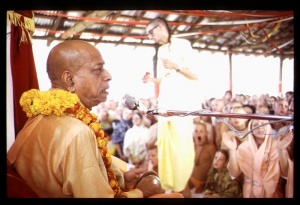SB 6.1.24: Difference between revisions
m (1 revision(s)) |
No edit summary |
||
| Line 1: | Line 1: | ||
{{info | {{info | ||
|speaker= | |speaker=Śukadeva Gosvāmī | ||
|listener=King | |listener=King Parīkṣit | ||
}} | }} | ||
[[Category:Srimad-Bhagavatam - Canto 06 Chapter 01]] | |||
[[Category:Bhagavatam Verses Spoken by Sukadeva Gosvami - Vanisource|060124]] | |||
<div style="float:left">'''[[Srimad-Bhagavatam]] - [[SB 6|Sixth Canto]] - [[SB 6.1: The History of the Life of Ajamila|Chapter 1: The History of the Life of Ajāmila]]'''</div> | |||
<div style="float:right">[[File:Go-previous.png|link=SB 6.1.23]] '''[[SB 6.1.23]] - [[SB 6.1.25]]''' [[File:Go-next.png|link=SB 6.1.25]]</div> | |||
{{RandomImage}} | |||
==== TEXT 24 ==== | ==== TEXT 24 ==== | ||
<div | <div class="verse"> | ||
tasya pravayasaḥ putrā | :tasya pravayasaḥ putrā | ||
daśa teṣāṁ tu yo 'vamaḥ | :daśa teṣāṁ tu yo 'vamaḥ | ||
bālo nārāyaṇo nāmnā | :bālo nārāyaṇo nāmnā | ||
pitroś ca dayito bhṛśam | :pitroś ca dayito bhṛśam | ||
</div> | </div> | ||
| Line 16: | Line 22: | ||
==== SYNONYMS ==== | ==== SYNONYMS ==== | ||
<div | <div class="synonyms"> | ||
''tasya''—of him (Ajāmila); ''pravayasaḥ''—who was very old; ''putrāḥ''—sons; ''daśa''—ten; ''teṣām''—of all of them; ''tu''—but; ''yaḥ''—the one who; ''avamaḥ''—the youngest; ''bālaḥ''—child; ''nārāyaṇaḥ''—Nārāyaṇa; ''nāmnā''—by name; ''pitroḥ''—of the father and mother; ''ca''—and; ''dayitaḥ''—dear; ''bhṛśam''—very. | |||
</div> | </div> | ||
| Line 23: | Line 29: | ||
==== TRANSLATION ==== | ==== TRANSLATION ==== | ||
<div | <div class="translation"> | ||
That old man Ajāmila had ten sons, of whom the youngest was a baby named Nārāyaṇa. Since Nārāyaṇa was the youngest of all the sons, he was naturally very dear to both his father and his mother. | That old man Ajāmila had ten sons, of whom the youngest was a baby named Nārāyaṇa. Since Nārāyaṇa was the youngest of all the sons, he was naturally very dear to both his father and his mother. | ||
</div> | </div> | ||
| Line 30: | Line 36: | ||
==== PURPORT ==== | ==== PURPORT ==== | ||
<div | <div class="purport"> | ||
The word pravayasaḥ indicates Ajāmila's sinfulness because although he was eighty-eight years old, he had a very young child. According to Vedic culture, one should leave home as soon as he has reached fifty years of age; one should not live at home and go on producing children. Sex life is allowed for twenty-five years, between the ages of twenty-five and forty-five or, at the most, fifty. After that one should give up the habit of sex life and leave home as a vānaprastha and then properly take sannyāsa. Ajāmila, however, because of his association with a prostitute, lost all brahminical culture and became most sinful, even in his so-called household life. | The word ''pravayasaḥ'' indicates Ajāmila's sinfulness because although he was eighty-eight years old, he had a very young child. According to Vedic culture, one should leave home as soon as he has reached fifty years of age; one should not live at home and go on producing children. Sex life is allowed for twenty-five years, between the ages of twenty-five and forty-five or, at the most, fifty. After that one should give up the habit of sex life and leave home as a ''vānaprastha'' and then properly take ''sannyāsa''. Ajāmila, however, because of his association with a prostitute, lost all brahminical culture and became most sinful, even in his so-called household life. | ||
</div> | </div> | ||
__NOTOC__ | |||
<div style="float:right; clear:both;">[[File:Go-previous.png|link=SB 6.1.23]] '''[[SB 6.1.23]] - [[SB 6.1.25]]''' [[File:Go-next.png|link=SB 6.1.25]]</div> | |||
__NOTOC__ | |||
__NOEDITSECTION__ | |||
Revision as of 05:07, 11 May 2021

A.C. Bhaktivedanta Swami Prabhupada
TEXT 24
- tasya pravayasaḥ putrā
- daśa teṣāṁ tu yo 'vamaḥ
- bālo nārāyaṇo nāmnā
- pitroś ca dayito bhṛśam
SYNONYMS
tasya—of him (Ajāmila); pravayasaḥ—who was very old; putrāḥ—sons; daśa—ten; teṣām—of all of them; tu—but; yaḥ—the one who; avamaḥ—the youngest; bālaḥ—child; nārāyaṇaḥ—Nārāyaṇa; nāmnā—by name; pitroḥ—of the father and mother; ca—and; dayitaḥ—dear; bhṛśam—very.
TRANSLATION
That old man Ajāmila had ten sons, of whom the youngest was a baby named Nārāyaṇa. Since Nārāyaṇa was the youngest of all the sons, he was naturally very dear to both his father and his mother.
PURPORT
The word pravayasaḥ indicates Ajāmila's sinfulness because although he was eighty-eight years old, he had a very young child. According to Vedic culture, one should leave home as soon as he has reached fifty years of age; one should not live at home and go on producing children. Sex life is allowed for twenty-five years, between the ages of twenty-five and forty-five or, at the most, fifty. After that one should give up the habit of sex life and leave home as a vānaprastha and then properly take sannyāsa. Ajāmila, however, because of his association with a prostitute, lost all brahminical culture and became most sinful, even in his so-called household life.